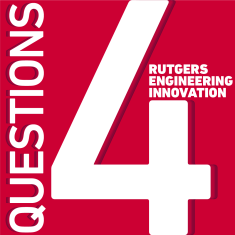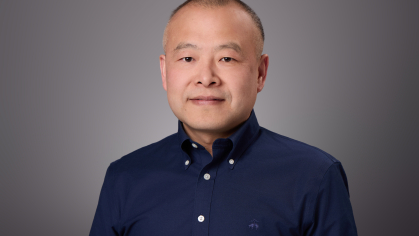Four Questions for Prof. Burlion: Pushing Aerospace Systems to Their Limits for Optimal Performance

Assistant professor of mechanical and aerospace engineering Laurent Burlion has been focusing his research interests on non-linear control systems, safe control of UAVs, spacecraft attitude control, and flight control and protection since he joined the Rutgers University School of Engineering faculty in 2019. He is among the mechanical and aerospace engineering faculty members working in the cutting-edge Emil Buehler Aerospace Lab to advance drone-related research.
Burlion began his career in his native France, as an expert engineer for the Ministère de la Défense before serving as a research scientist for French Aerospace Lab Onera, where he developed a passion for flight systems.
While the pandemic briefly stopped his lab experiments in summer 2020, he is currently pursuing several research collaborations with SoE faculty. He is working with MAE colleague Onur Bilgen who is leading one of 13 teams on a project funded by the U.S. Department of Energy’s Advanced Research Projects Agency (ARPA-E) $26 million investment in developing new technologies to advance floating offshore wind turbines (FOWTs) as a clean energy solution for New Jersey.
“Batteries’ Sharing for Autonomous Aerial Vehicles,“ is a multidisciplinary project at the frontier of aerospace and electrical engineering. Together with industrial and systems engineering professor Zhimin Xi, Burlion is developing drones that can be built more efficiently by designing the battery and flight control algorithms at the same time.
What most excites and inspires you about your research?
I like to prove and demonstrate how things will work. My passion for flying systems inspired me to look at some new problems to develop – as well as certify – safer flight control systems. How are we sure everything will work well? How can we safely push aerospace systems to their limits to get the best performance? This is what really motivates my research.
What sparked your interest in aerospace engineering and what led to your current research interests?
First, I was an electrical engineer specializing in control theory and became a fan of aerospace applications a bit late.
I discovered aerospace when I joined Onera, the French Aerospace Lab in 2010 and moved to Toulouse, France, which is the center of Europe’s aircraft building industry. I worked with planes all the time there and fell in love with them. Flight is now my passion. Before I was just a fan of math – but now I am very much interested in aerospace systems.
I’m proud of my recent collaboration with Rutgers and France, which is funded to provide the same drones and equipment for a common course between CentraleSupélec, which is part of the University of Paris Saclay and ranked 14th in the world, and Rutgers.
This collaboration may create internship opportunities for Rutgers and French students.
I’m also involved in interesting collaborations with SoE colleagues. I connected with Department of Industrial and Systems Engineering assistant professor Zhimin Xi on a Team Science Initiative funded by Rutgers University and the School of Engineering. We’re aiming to build drones that minimize the energy that drones use in package delivery. I’d like to see this technology industrialized.
I’m also working with MAE department colleague Onur Bilgen on a funded project to optimize design and controls while reducing the price of wind energy to make it competitive. This is an especially challenging project, because we are working with FOWTs.
Who will most benefit from your research results?
The research community will benefit, as I add to existing knowledge by publishing papers. My research will help companies in the aerospace industry better solve control problems. My solutions start with existing solutions, but go beyond. I like to be at the intersection of academia and industry, because industry presents the most interesting problems – and academia provides the mathematical framework to solve them.
My students will also be able to grow through research.
How are Rutgers students contributing to the work being done in your lab?
The biggest contribution from Rutgers students is the experimental part. Before Rutgers, I didn’t fly drones – I only worked on simulations and theoretical developments. My Rutgers students have helped me to design, build, and fly drones.
I enjoy interacting with my students. I like to shape their minds and see them grow. I enjoy showing students how to follow an incremental approach to solve a problem.
I see links between teaching and my research: a classroom is a control system. As a controls guy, I like to ask for student feedback and then take that feedback into account. I also like to detect talented people I can invite to join my lab.


